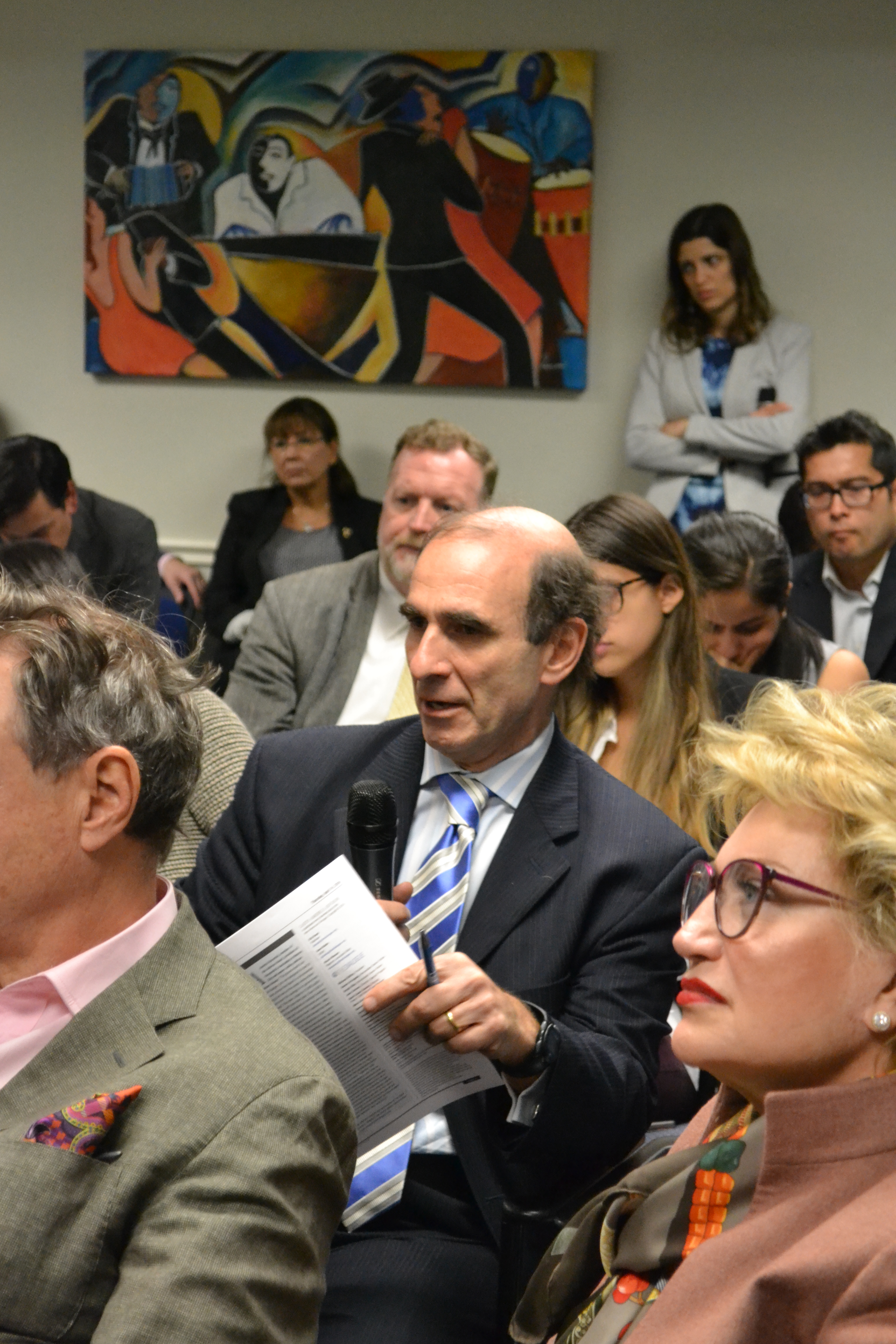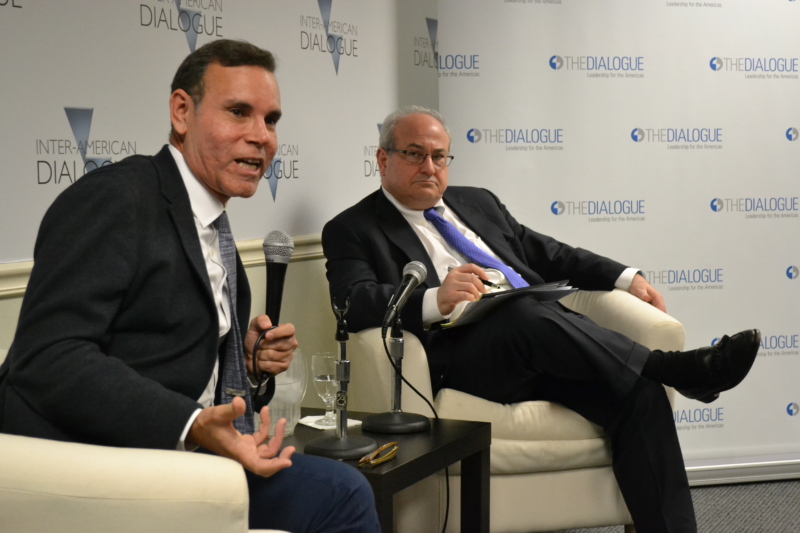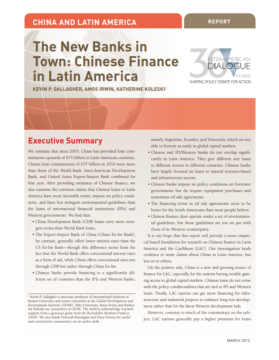Hugo Stay Home
Hugo Chavez, the Venezuelan president, has clearly been enticed by the Libyan drama, where his longtime friend and ally, Muammar al-Qaddafi, is under siege from rebel forces.
Four months ago, the Venezuelan opposition achieved a resounding victory in the legislative elections, garnering enough votes to hold an absolute majority in the National Assembly. Today, many of its attempts to remove Nicolás Maduro from power have been thwarted by pro-government institutions. On April 14th, the Inter-American Dialogue invited Luis Vicente León, president of polling agency Datanálisis, to discuss the current situation in the country and what can be expected for both the Maduro regime and the opposition in the coming months.
The event began with introductory remarks by Michael Shifter, president of the Dialogue. Shifter noted how since the December 6th elections, there has been little progress in Venezuela, which still finds itself mired in a profound economic crisis.
Following Shifter’s remarks, León began his intervention by stating some well-known facts. For instance, it is clear that Maduro is losing popularity and that chavismo is now a minority, as evidenced by the number of votes cast for the opposition in the December elections. Moreover, this is the first election that the opposition has won in 17 years, which demonstrates cohesion and strength, León asserted.
.@luisvicenteleon explains why the opposition-controlled assembly has been weak #VZCrisis pic.twitter.com/jRNXnFUP55
— The Dialogue (@The_Dialogue) April 14, 2016
Nevertheless, some things are less clear. Maduro’s popularity decreased from 33% in March to 26.7% in April. However, until March, his approval rates had remained constant, meaning that he had maintained his level of popularity even in the face of an electoral defeat, which León indicated is usually followed by a drop in the polls. Moreover, the opposition did not see the usual increase that comes with an electoral victory. According to León, these indicators all contradict the expectations that the end of chavismo was close following the results of the December elections.
He then went on to discuss the measures that the Maduro government has taken to maintain its firm grip on power. Maduro has been repeatedly accused of abusing his power, which for León leads to a very simple conclusion. “If people think he is abusing his power, it is because he actually has power,” he assured. Consequently, the perception that the majority of people had after the elections of a powerless government was simply not true.
[caption id="attachment_49104" align="alignright" width="336"] Photo by Ben Raderstorf / Inter-American Dialogue[/caption]
Photo by Ben Raderstorf / Inter-American Dialogue[/caption]In terms of the actual electoral result, León mentioned how it is important to look at the number of votes cast, not the number of Assembly seats garnered. While the opposition obtained 68% of representatives, it did so with 56% of the votes, León clarified. This means that chavismo obtained more than 40% of the votes in the middle of one of the most important crisis in Venezuela. “We are not talking about a destroyed chavismo. They are a minority, but a very important one,” León argued, noting that they still control the media, the military, and the executive, among others.
From an institutional perspective, León highlighted the difference between what the constitution states the National Assembly can do – such as dismiss ministers, enact constitutional reforms, and change judges in the Supreme Court – and what it can actually do. The Assembly has been unable to fully exercise its constitutional faculties because the government controls the rest of the institutions, León asserted. He further argued that the Supreme Court is the most important institution right now, yet it is biased, which leaves the Assembly with few courses of action. “The Court stands for the revolution, not the constitution,” León emphasized. He believes this is concerning because as the opposition realizes that it cannot exercise its constitutional rights, radicals within the opposition may gain traction and increase the chances that they “go out on the street and fight.” When asked why the opposition seems powerless, he argued that it is due not only to government control of most institutions but also to divisions within the opposition.
Coup unlikely - arguably now a military government supporting a constitutional president #VZcrisis @luisvicenteleon pic.twitter.com/9NhhaKduBC
— The Dialogue (@The_Dialogue) April 14, 2016
Finally, León analyzed the possible scenarios ahead for Venezuela. He argued that while most people in Washington seem to think that it is impossible for Maduro to maintain power until the end of his term, it is very possible he does. He noted how most people are getting used to living in crisis – to lines for food and milk and loss of jobs – and that many are even profiting from the arbitrage created by such conditions. Moreover, he sees a social explosion as unlikely, as previous outcries have lacked a connection to the Venezuelan popular base. Lastly, he noted that the military still has significant power within the Maduro cabinet and they thus prefer to maintain the status quo. León insisted that the military is not negotiating with the opposition to kick Maduro out.
When asked about the possibility of dialogue between the government and the opposition, he argued that this will not happen, especially considering that there is little dialogue within the opposition itself. All of this seems to indicate that the current social, political, and economic situation in Venezuela is unlikely to change in the near future.
Hugo Chavez, the Venezuelan president, has clearly been enticed by the Libyan drama, where his longtime friend and ally, Muammar al-Qaddafi, is under siege from rebel forces.
Estimates of the volume, composition, and characteristics of Chinese lending to the region since 2005.
Is the Venezuelan government likely to comply with the IACHR’s ruling or will it uphold the ban?
 Ben Raderstorf / Inter-American Dialogue
Ben Raderstorf / Inter-American Dialogue
